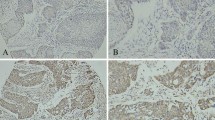Abstract
Objective
To examine the expression of vascular endothelial growth factor C (VEGF-C) in human esophageal squamous cell carcinoma (ESCC), and to clarify its role in lymphatic metastasis in ESCC patients.
Methods
Esophageal carcinoma EC9706 cells and samples from 49 patients with primary ESCC were investigated by using S-P immunohistochemistry (IHC), the semi-quantitative reverse transcriptase-polymerase chain reaction (RT-PCR) and in situ hybridization (ISH) methods for VEGF-C expression.
Results
VEGF-C positive expression was found in EC9706 cells through IHC, ISH and RT-PCR. Positive IHC for VEGF-C was observed in 36 of 49 cases of ESCC. There was a significant difference between the expression of VEGF-C in a lymph-node-positive group compared to a node-negative group (χ2=4.7, P<0.05). Positive ISH for VEGF-C mRNA was observed in 23 of 49 cases of ESCC. There was a significant difference between the expression of VEGF-C in the lymph-node-positive group and node-negative group (χ2=31.3, P<0.01). The expression of VEGF-C was significantly higher in the lymph-node-positive group compared to the node-negative group. Of 49 ESCC tissues, RT-PCR for VEGF-C mRNA was observed positively in 29 cases. There was a significant difference between the expression of VEGF-C in the lymph-node-positive group and node-negative group (χ2=23.3, P<0.01). The expression of VEGF-C was significantly higher in the lymphnode-positive group compared to the node-negative group. Expressions of VEGF-C were not significantly associated with age, gender, and pathological grade. There was a relationship between VEGF-C mRNA expressions by RT-PCR and ISH (χ2=18.5, P<0.01) in ESCC cases, but with no significant difference between the two methods.
Conclusion
VEGF-C expression may induce lymphangiogenesis in human ESCC. There was a close correlation between VEGF-C expression and lymph node metastasis. VEGF-C can serve as a useful prognostic factor for ESCC patients.
Similar content being viewed by others
References
Nathanson SD. Insights into the mechanisms of lymph mode metastasis. Cancer. 2003; 98:413–423.
Liu XE, Sun XD, Wu JM. Expression and significance of VEGF-C and FLT-4 in gastric cancer. World J Gastroenterol. 2004; 10:352–355.
Chen KS, Zhang L, Tang L, et al. Expression of heparanase mRNA in anti-sense oligonucleotide-transfected human esophageal cancer EC9706 cells. World J Gastroenterol. 2005; 11:4916–4917.
Yonemura Y, Fushido S, Bando E, et al. Lymphangiogenesis and the vascular endothelial growth factor receptor (VEGFR)-3 in gastric cancer. Eur J Cancer. 2001; 37:918–923.
Arinaga M, Noguchi T, Takeno S, et al. Clinical significance of vascular endothelial growth factor C and vascular endothelial growth factor receptor 3 in patients with nonsmall cell lung carcinoma. Cancer. 2003; 97:457–464.
Skobe M, Hawighorst T, Jackson DG, et al. Induction of tumor lymphangiogenesis by VEGF-C promotes breast cancer metastasis. Nat Med. 2001; 7:192–198.
Hanrahan V, Currie MJ, Gunningham SP, et al. The angiogenic switch for vascular endothelial growth factor (VEGF)-A, VEGF-B, VEGF-C, and VEGF-D in the adenoma-carcinoma sequence during colorectal cancer progression. J Pathol. 2003; 200:183–194.
Shi XY, Li HY, Liu YQ, et al. The roles of VEGF-C and its receptor flt-4 in lymphangiogenesis and metastasis of cervical cancer. Chin J Clin Oncol. 2005; 32:181–184 (Chinese).
Veikkola T, Jussila L, Makinen T, et al. Signaling via vascular endothelial growth factor receptor-3 is sufficient for lymphangiogenesis in transgenic mice. EMBO J. 2001; 20:1223–1231.
Karpanen T, Egeblad M, Karkkainen MJ, et al. Vascular endothelial growth factor C promotes tumor lymphangiogenesis and intralymphatic tumor growth. Cancer Res. 2001; 61:1786–1790.
Stacker SA, Williams RA, Achen MG. Lymphangiogenic growth factor as markers of tumor metastasis. APMIS. 2004; 112:539–549.
Onogawa S, Kitadai Y, Amioka T, et al. Expression of vascular endothelial growth factor (VEGF)-C and VEGF-D in early gastric carcinoma: correlation with clinicopathological parameters. Cancer Lett. 2005; 226:85–90.
George ML, Tutton MG, Janssen F, et al. VEGF-A. VEGF-C, and VEGF-D in colorectal cancer progression. Neoplasia. 2001; 3:420–427.
Achen MG, McColl BK, Stacker SA. Focus on lymphangiogenesis in tumor metastasis. Cancer Cell. 2005; 7:121–127127.
Chen ZT, Varney ML, Backora MW, et al. Down-regulation of vascular endothelial growth factor-C expression using interfering RNA vecters in mammary spontaneous metastasis and enhances survival. Cancer Res. 2005; 65:9004–9011.
Author information
Authors and Affiliations
Corresponding author
Additional information
This work was supported by a grant from the National Natural Science Foundation of China (No.30470779) and the Henan Innovation Project for University Prominent Research Talents (No.2006KYCX016)
About this article
Cite this article
Zhang, H., Zhang, L., Chen, K. et al. Expression of vascular endothelial growth factor C and its clinical significance in human esophageal squamous cell carcinoma. Chin. J. Clin. Oncol. 4, 83–88 (2007). https://doi.org/10.1007/s11805-007-0083-y
Received:
Accepted:
Issue Date:
DOI: https://doi.org/10.1007/s11805-007-0083-y




